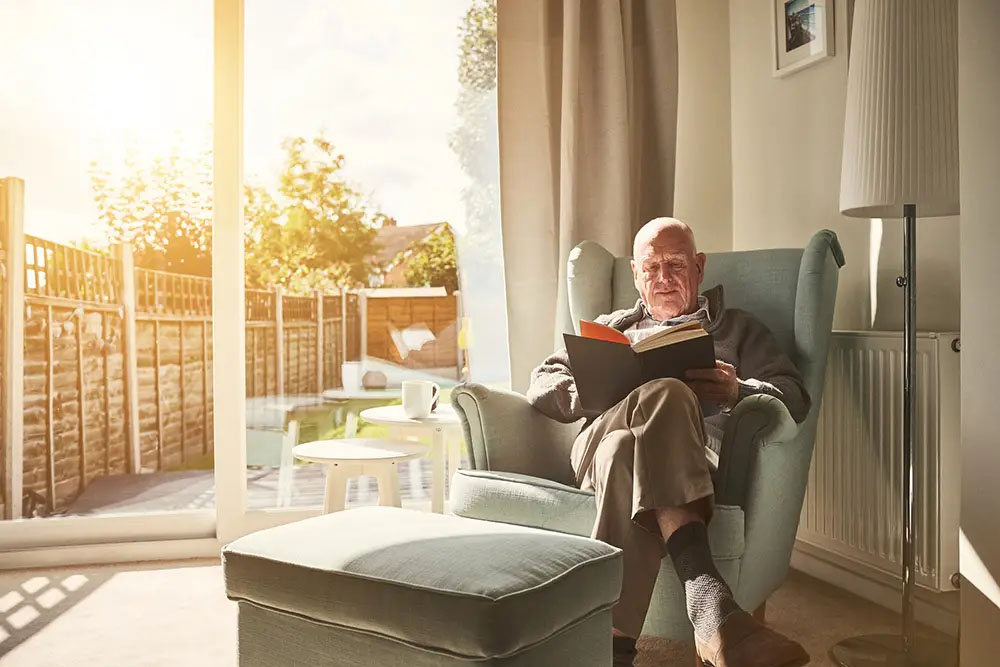Laughter truly is the best medicine – especially for people living with Alzheimer’s or other forms of dementia. Watching funny movies together can reduce anxiety, ease tension, and spark positive memories. For individuals who have been diagnosed with Alzheimer’s or other forms of dementia, a lighthearted film can also offer a welcome sense of comfort and connection.
At Duxbury House, movie viewings are part of our warm, personalized Memory Care programming. We’ve seen how a familiar film or cheerful musical number can brighten someone’s day, provide moments of joy, and bring loved ones closer together.
We want to share how you can enjoy some of this at home with your loved one. To help, we’ve compiled a curated list of funny movies for dementia patients, plus tips on how to choose the right film and make movie night a happy, meaningful experience.
Why Laughter Matters for People With Dementia
When someone is living with dementia, finding ways to foster connection and ease emotional stress is essential. Humor plays an important role in this. Laughter can:
- Boost mood and reduce feelings of anxiety or agitation
- Create shared experiences between caregivers, family, and loved ones
- Help stimulate memory recall through familiar scenes, music, or dialogue
For people with dementia, classic movies or comedies they once loved can often tap into long-term memory. A favorite actor or actress, a well-known musical number or even a funny scene they used to enjoy can trigger emotional responses that feel familiar and safe.
How To Choose a Movie for Your Loved One With Dementia
Not every comedy will be a good fit – the best movies for dementia patients are simple, warm, and rooted in positivity. Here’s what to look for:
- Simple, easy-to-follow plots: Avoid fast pacing, excessive flashbacks or complicated storylines.
- Familiarity: Classic movies or films your loved one used to enjoy are often the most comforting.
- Uplifting, gentle humor: Lighthearted and non-offensive comedy is ideal. Avoid anything too intense, loud or jarring.
- Personal preferences: If they used to love musicals or a certain actor or actress, start there!
Need inspiration? Read on for a list of great options.

Top 8 Funny Movies for Dementia Patients
Here are our top recommendations for funny movies for dementia patients, with a mix of classic movies, musicals, and animated favorites that are known to spark laughter and positive emotions:
“Some Like It Hot“
A timeless comedy starring Marilyn Monroe, Tony Curtis, and Jack Lemmon. Lighthearted, familiar, and full of physical comedy that doesn’t rely on complex dialogue.
“Mary Poppins”
This cheerful musical combines whimsy, music, and magic. The upbeat songs and familiar characters often evoke joy and nostalgia.
“The Princess Bride”
A humorous fairy tale adventure with lovable characters and memorable lines. Its simple storytelling and gentle humor make it a comforting choice.
“Tootsie”
Starring Dustin Hoffman, this heartwarming comedy blends humor and emotion. The storyline is straightforward, and the characters are easy to connect with.
“The Sound of Music”
Though not strictly a comedy, this musical offers uplifting moments, beautiful music, and a familiar story many people remember fondly.
“Paddington”
This is a newer film but is perfect for its sweet humor, gentle pacing, and charming characters. Paddington’s silly adventures are easy to follow and endearing.
“Finding Nemo”
The vibrant visuals and lovable characters bring smiles without overwhelming.
“The Odd Couple”
This is a classic buddy comedy that’s simple, familiar, and filled with light banter. The relationship dynamics are easy to follow and often relatable.
Bonus: Lighthearted TV Shows for Shorter Viewing
For quick bursts of joy or to fit some fun into shorter time spans, try familiar TV shows with simple plots and gentle humor. Good options include:
- “The Andy Griffith Show”
- “I Love Lucy”
- “The Golden Girls”
- “Happy Days”
- “The Carol Burnett Show”
Tips for Making Movie Time a Positive Experience
Creating the right setting for movie time can help your loved one feel calm, connected, and more engaged.
- Set the scene: Choose a quiet, familiar space with low lighting and cozy seating.
- Watch together: Your presence adds comfort and gives you a chance to laugh and reminisce together.
- Go with the flow: If your loved one seems disinterested or anxious, it’s okay to pause or change the movie.
- Spark conversation: After the movie, talk about favorite parts or memories it brought back.
How Duxbury House Supports Joyful Living With Memory Care
At Duxbury House, we believe joyful living is possible at every stage. Our Memory Care team thoughtfully incorporates engaging activities – including movie viewings – into daily routines to help residents feel at ease.
By focusing on personal preferences, gentle routines, and emotionally supportive programs, we’re able to offer moments of joy, connection, and laughter that truly matter. Our movie nights are more than just entertainment – they’re a chance to reminisce, reconnect, and feel part of a community that understands.
Looking for More Joyful Moments in Memory Care?
Duxbury House creates a supportive environment where individuals diagnosed with Alzheimer’s or other forms of dementia can thrive. With personalized care, comforting routines, and uplifting activities like movie nights, we help our residents feel seen, supported, and loved.
Contact us today to schedule a tour and learn more about how Duxbury House makes a positive difference for those living with dementia.













